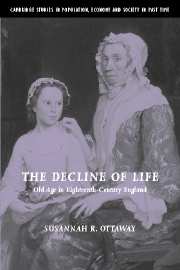Book contents
- Frontmatter
- Contents
- List of figures
- List of tables
- Acknowledgments
- List of abbreviations
- Introduction: Old age in eighteenth-century England: no “golden age of aging”
- 1 Who was “old” in eighteenth-century England?
- 2 The activities of the “helmsman”: self-reliance, work, and community expectations of the elderly
- 3 “The comforts of a private fire-side”
- 4 Independent but not alone: family ties for the elderly
- 5 Community assistance to the aged under the Old Poor Law
- 6 Continuity and change in community assistance to the elderly over the eighteenth century
- 7 Within workhouse walls: indoor relief for the elderly
- Conclusion: Old age as a useful category of historical analysis
- Bibliography
- Index
1 - Who was “old” in eighteenth-century England?
Published online by Cambridge University Press: 15 December 2009
- Frontmatter
- Contents
- List of figures
- List of tables
- Acknowledgments
- List of abbreviations
- Introduction: Old age in eighteenth-century England: no “golden age of aging”
- 1 Who was “old” in eighteenth-century England?
- 2 The activities of the “helmsman”: self-reliance, work, and community expectations of the elderly
- 3 “The comforts of a private fire-side”
- 4 Independent but not alone: family ties for the elderly
- 5 Community assistance to the aged under the Old Poor Law
- 6 Continuity and change in community assistance to the elderly over the eighteenth century
- 7 Within workhouse walls: indoor relief for the elderly
- Conclusion: Old age as a useful category of historical analysis
- Bibliography
- Index
Summary
When the young beauty Marianne Dashwood is teased about Colonel Brandon's affection for her in Jane Austen's Sense and Sensibility, she responds with astonishment.
“You cannot deny the absurdity of the accusation … Colonel Brandon may not be as old as Mrs. Jennings, but he is old enough to be my father; and if he were ever animated enough to be in love, must have long outlived every sensation of the kind. It is too ridiculous! When is a man supposed to be safe from such wit, if age and infirmity will not protect him?”
“Infirmity!” said Elinor, “do you call Colonel Brandon infirm? I can easily suppose that his age may appear much greater to you than to my mother; but you can hardly deceive yourself as to his having the use of his limbs!”
“Did you not hear him complain of rheumatism? And is not that the commonest infirmity of declining life?”
“My dearest child,” said her mother laughing, “at this rate you must be in continual terror of my decay; and it must seem to you a miracle that my life has extended to the advanced age of forty.”
“Mama, you are not doing me justice. I know very well that Colonel Brandon is not old enough to make his friends apprehensive of losing him in the course of nature. He may live twenty years longer. But thirty-five has nothing to do with matrimony. ”
- Type
- Chapter
- Information
- The Decline of LifeOld Age in Eighteenth-Century England, pp. 16 - 64Publisher: Cambridge University PressPrint publication year: 2004

